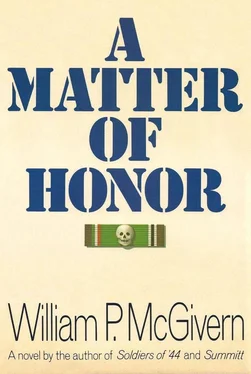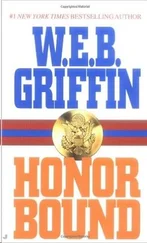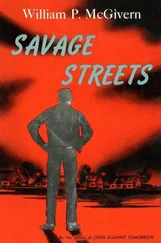“The top Army brass is still using you, Riley,” Weir said. “That’s all the vindication a man needs.”
At the airport the driver pulled past the main terminal and took a narrow road behind the maintenance sheds to a corner of the tarmac where a four-seater Bonanza was taxiing into position. The two passengers stepped from the limo, while the driver stowed Weir’s single piece of luggage in the plane, then left the field through a black and white striped exit gate.
Lenox Riley looked appraisingly at the plane, then said, “You strap into the rear passenger seat, general. I’ll sit next to the pilot.” He swung himself into the second cockpit seat, put a hand inside his jacket and removed the .38 special from a shoulder holster. He rested the gun on his knee.
“I’m presuming your German is more fluent than mine, general. Tell our pilot I understand something about planes and I can read flight plans and instrument panels.”
“I speak English,” the pilot said.
“Very well,” Riley said. “We want to deliver Mr. Weir to Munich by eight o’clock so he can be aboard Lufthansa 257 for a nine o’clock flight. And we want no mistakes.”
The pilot nodded, turned the plane one hundred and eighty degrees and began to taxi around the perimeter of the field. A row of private planes stood parked at one side of the area, dark and locked for the night. Two small feeder lines were boarding passengers at the brightly lit terminal and in the public parking lot a pair of local taxis idled, while a few parked cars shone under arc lights.
Riley sat beside the pilot, silent but alert, eyes traveling over the expanse of air field. Suddenly the plane’s headbeams picked out the black and white striped exit gate.
“Goddamnit!” Riley said abruptly. “We’re right back where we started from!”
“I’m waiting for the control tower...” the pilot began.
“Listen, you swine...” Riley’s voice broke into a yelp of pain as Tarbert Weir leaned forward suddenly and struck him a fast blow on the neck with the blade of his hand. Riley was dazed but struggling when the pilot knocked him unconscious with a second blow that caught a vital artery. The man slid sideways, breathing raggedly.
Weir reached forward and lifted the Smith and Wesson from Riley’s limp hand. Fritz Vestrick turned in the pilot’s seat to look at him. “Jesus, Scotty, you tapped him like some kid testing a ripe watermelon.”
“I’d have got him the second time,” Weir said. “He fooled me, he’s as drunk and relaxed as a turkey.” The general shook his head sadly. “I’ll take my gear now, Fritz. Can you believe that poor dumb bastard thinks he’s got a sixth sense going for him?”
Vestrick handed the waterproof pouch to Weir and a set of car keys. “My Mercedes is parked right in front of the terminal. There’s a rabbit’s foot tied to the mirror, you can’t miss it.”
“How much fuel do you have?”
“Enough to cruise at four thousand feet for a while, then enough to get him there and get me back. I’ll have him on the ground in Munich at half-past nine sharp.”
Weir opened the plane door and swung his suitcase to the tarmac. Then he reached out and gripped Vestrick’s broad shoulder. “Auf wiedersehen, pardner,” he said. “I’ll call you from Springfield when it’s all over.”
The weather had turned bitter, an early spring snowstorm sharp with wind and sleeting snow. Sometimes the flakes seemed to be falling from the dark skies; at other moments the flurries were lifted in gusts from the rock-hard ground and swirled against the assembled troops, tanks and guns with stinging force by mountain winds.
The patroled area allocated for Combined NATO Forces maneuvers, several square miles of field and wood in southern Germany near the Czechoslovakian border, was crowded with hundreds of soldiers and tanks, guns, heavy equipment, plus temporary executive and housing quarters, but the organization and discipline, the limited communications between the polyglot troops and the demands of the rough terrain and weather seemed to isolate the region in a cone of near silence.
The Lucky Thirteenth, with its M60 tanks with 105mm snouts, stretched out on either side of Lasari’s assigned position, hidden in clumps of trees or behind escarpments of rock camouflaged by cut fir branches and mottled canvas netting, shadowed under the night sky.
As Private George Jackson, Lasari’s orders had assigned him to act as tactical observer and assistant scanner to a French tank technician with a sergeant’s rank. That man sat now in a metal sling seat, legs swinging free, as he monitored the night beam and scopes of a Chaparral, part of the Army’s air defense weapons system.
Above the military scene, the air was occasionally whipped and churned by Cobra choppers patrolling the activities of the various sectors.
Lasari asked to borrow a pair of field glasses from the Frenchman and trained them on the horizon, picking out the details of action on the Czech border. Electrically wired fences stood ten feet tall for as far as he could see, illuminated at intervals by yellow arc lights that silhouetted the NATO troops patrolling West German soil, and litup the machine gun towers on the Czech perimeter of the snowy woodlands, both sides guarding a strip of no-man’s land.
Lasari returned the glasses, flexed his stiff fingers and stamped his boots on the icy soil. He had stood in the same position for more than three hours and his hands and feet were almost without feeling. In the days since leaving Heidelberg he had tried to reevaluate his dilemma, to make judgments without panic. Now the potential of this unfamiliar locale, with its parameters and boundaries and searchlights, had stamped itself in his mind like a free-form map. The border crossover into Czechoslovakia was impossible, a deathtrap. To the north, troop deployments occupied the territory for at least five miles. If he could split south in the darkness and reach the Bavarian Alps, he might make it to the Austrian border. From there it could be Italy, Yugoslavia, a boat to Greece... Even though a deserter, he was at this moment an ordinary GI, absent without leave. At two o’clock he would become something else.
An American officer strode by and called out, “Everything normal at this grid?”
“Certainement,” the Frenchman said. “The enemy is looking at us and we are looking at him.” Lasari glanced at his watch. It was 0155 hours.
A few moments later a fresh-faced GI, a reddish cowlick sticking out from under his helmet, slogged over to Lasari and said, “I’m your relief watch. Take a break, soldier.”
Lasari and several dozen soldiers on relief broke position and headed toward the makeshift canteens and latrines sheltered some distance away. Lasari knew he was expected to proceed five hundred yards to Grid 14, to the first latrine on his left, go inside and wait five minutes. Jesus, I don’t even want the burden of choice, Lasari thought. Both decision and indecision seemed equally impossible and he remembered what seasoned GIs in ’Nam had said to newcomers with troubles... just forget it, soldier, write it in your diary, dig a hole in the ground and bury it, but forget it...
A short time later he stood before a urinal in the frigid latrine, shielded on both sides by corrugated slabs of grayish plastic. There were a dozen men in the shed, but no one spoke. There was no joking, no feeling of camaraderie, just a chilled, cross-section of men in different uniforms with different signias, savoring a few moments of respite from the sting of cold winds.
Lasari glanced about him, letting his gaze touch each uniformed stranger. “... even though you do not see us, please do not make the mistake of thinking we do not see you,” Pytor Vayetch had said.
Читать дальше












